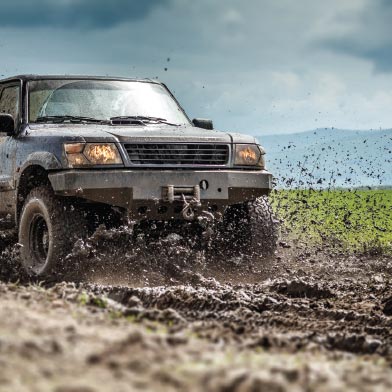Understanding the difference between all-wheel drive or a four-wheel drive can help you determine which one is the better fit for you.

Table of Contents
When shopping for a new or used vehicle, the options can sometimes feel endless. One of them could involve deciding between an all-wheel drive (AWD) or a four-wheel drive (4WD) vehicle. Understanding the difference between these two driving systems can help you determine which one is the better fit for you.
Due to their similarities, AWD and 4WD are easily confused. The simplest way to tell them apart is by remembering that AWD systems are “always on,” whereas a 4WD system is usually disengaged until the driver engages it.
WHAT IS AWD, AND HOW DOES IT WORK?
AWD systems are a type of four-wheel drive that helps increase your traction and ability to accelerate in slippery conditions. These systems use a central differential or dual-clutch system to route torque (i.e., rotational force) to a wheel that’s starting to slip, whether it’s on the front or rear axle. These systems not only make it easier to drive on wet or snowy roads, but also give you better fuel economy and a more comfortable ride in comparison to a 4WD vehicle. AWD systems have the advantage of either powering all four wheels continuously or automatically controlling which wheel will receive the additional torque needed for control and stability.
WHO IS BEST SUITED FOR AN AWD VEHICLE?
AWD systems are ideal for drivers who travel frequently in rainy or snowy conditions, as the additional traction offers better control of the vehicle in treacherous situations and can help prevent accidents. Depending on the type of vehicle purchased, AWD systems can also slightly boost vehicle performance, as the added traction that the all-wheel drive system provides while accelerating can result in better cornering and faster launches from a standing start.
WHAT IS 4WD, AND HOW DOES IT WORK?
Like AWD systems, 4WD systems send power to all four wheels of a vehicle. 4WD systems tend to be more robust than their AWD counterparts, allowing drivers of 4WD vehicles to take their vehicle off-road. These systems typically offer driver-selectable low- and high-range settings, with low-range settings providing aggressive traction used to conquer steep trails or mountainous terrain.
WHO IS BEST SUITED FOR A 4WD VEHICLE?
Ultimately, the debate between AWD vs. 4WD comes down to one simple question: Do you plan to take your vehicle off-roading? If your answer is yes, then a vehicle with 4WD probably makes the most sense. If you’re a driver primarily interested in a vehicle that can hold its own in inclement weather, an AWD vehicle may be your best bet.












